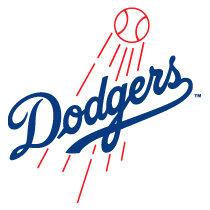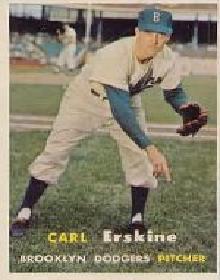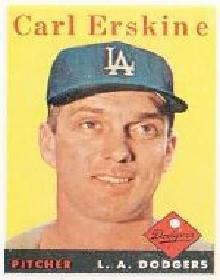






 |  |  |  |  |  |  |
 |

|
Carl Daniel Erskine was introduced to baseball at an early age. His father, Matt Erskine, taught that baseball was the hardest sport to learn. The game consisted of numerous strategies and maneuvers that perplexed the young Erskine. At the age of nine, his father enrolled him in a park baseball program. During the Great
Depression, as Erskine sharpened his abilities and started playing catch with his two older brothers, he learned the art of pitching. In no time, Erskine had mastered the straight overhand throwing technique and curve ball rotation every future pitcher needs as a professional baseball player.
Upon high school graduation in 1945, Erskine's aspiration to play baseball came to a halt. With World War II in full swing, he was drafted into the U.S. Navy and sent to Boston. A year later, Erskine introduced himself to the Navy recreation officer where he was stationed, and asked if he could play baseball. Already full of pitchers, he was turned away, but soon found consolation a few weeks later when scouted by the Dodgers and discharged from the Navy. Erskine spent the next year and a half in the minor leagues, at the time of widespread historical change in baseball.
While playing in 1947, baseball legend Jackie Robinson came on board the Brooklyn Dodgers as the first African-American player in Major League history. After pitching five innings in a challenging game in the spring of 1948, Robinson, who had watched Erskine pitch that game, befriended him and said, "You're going to be with us real soon." Truly inspired and with a great sense of optimism, Robinson's prediction came true. Later that year, Erskine joined the Brooklyn Dodgers.
In the late 40s, television was beginning to permeate American society and millions of people started to see baseball in a new way. No longer restricted to archaic radio waves, the heroes of the sport now had faces to go along with their larger-than-life reputations…another milestone that would eternally change the nature of games.
With his debut game on July 25, 1948, Erskine started to play along side other revered players such as Gil Hodges, Pee Wee Reese, Roy Campanella, Preacher Row, Duke Snider and Carl Furillo. "Oisk," as he was affectionately called by Brooklyn fans with their "Brooklynese" accents, started out as a relief pitcher going 21-10 during his first two incredible years. In 1951, when he became when he became the team's starting pitcher, Erskine finally had the chance to demonstrate his pitching skills on a regular basis. Over the next few years, he pitched in five World Series, winning one of them in 1955 against the New York Yankees. He pitched two no hit, no run games: one in 1952 against the Chicago Cubs and another in 1956 against the New York Giants. In addition, he led the National League in 1953 with 20 wins and six losses.
Throughout the 1950s, air travel changed the way people moved across the country. With West Coast cities experiencing dramatic population increases, the major leagues started to expand. In 1957, the Dodgers left Brooklyn, New York and headed to California to become the Los Angeles Dodgers. Erskine, who did not like being away from his family, decided that relocating was not for him. He lasted only a year and a half and pitched his last game on June 4, 1959 at the age of 32. His career spanned 12 seasons and accumulated 122 wins (.61).
After retiring from baseball, Erskine still had his whole life ahead of him. He returned to his native Indiana and started his own insurance business in 1960. For 12 years, he coached the Anderson University Raven baseball program winning four championship games. While in the insurance business, he sharpened his business acumen and landed a job at Star Financial Bank serving as its president and director from 1982-1993. Erskine has also given his time and talents to many organizations, sitting on the board of trustees of Anderson University, St. John's Medical Center, Fellowship of Christian Athletes and numerous other state and civic institutions.
In recognition of his accomplished baseball career, Erskine was inducted into the Indiana National Baseball Hall of fame in 1979. In 2001, he wrote his first book, "Tales from the Dodger Dugout," a collection of heart warming stories recounting his days in the major leagues. Four years later, he penned his memoir, "What I learned from Jackie Robinson," sharing his memories of Jackie's battle for racial equality and their enduring friendship that taught him important lessons about life.

 |  |  |  |  |  |  |